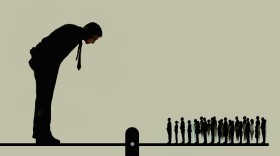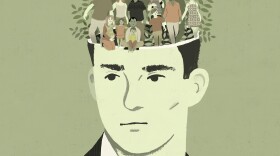
Jennifer Schmidt
Jennifer Schmidt is a senior producer for Hidden Brain. She is responsible for crafting the complex stories that are told on the show. She researches, writes, gathers field tape, and develops story structures. Some highlights of her work on Hidden Brain include episodes about the causes of the #MeToo movement, how diversity drives creativity, and the complex psychology of addiction.
Since joining NPR in January 2014, Schmidt has also worked as an editor on Morning Edition and All Things Considered. She has put together pieces for various news desks, including a story about survivor goats from the California wildfires for NPR's health blog Shots and a piece on a new trend in C-sections in which women can watch their babies being born which aired on Morning Edition.
The recipient of numerous journalism awards, Schmidt has been awarded a PRNDI for feature reporting, a National Headliners award for breaking news, a silver CINDY, an EMMA for editing, and various other awards from the RTNDA, the Associated Press, and the Society of Professional Journalists.
Schmidt's reporting has taken her across both the country and the world, from KPLU in Seattle and WBUR in Boston to freelancing in South Africa and Mexico. After living abroad for almost a decade, Schmidt now lives on a small farm near the Chesapeake Bay with a menagerie of animals including a one-eyed cat from South Africa, chickens, horses, two dogs from Mexico City, and goats.
Schmidt graduated magna cum laude with a B.A. from Middlebury College and an M.S. from the Medill School of Journalism at Northwestern University.
-
We all know the downsides of being poor. But what about the downsides of being rich? This week, we explore the psychology of scarcity...and excess.
-
Have you ever noticed that when something important is missing in your life, your brain can only seem to focus on that missing thing? Two researchers have dubbed this phenomenon "scarcity."
-
Nearly a quarter century ago, a group of women accused a prominent playwright of sexual misconduct. For the most part, the allegations went nowhere. In 2017, in the midst of the #MeToo movement, more women came forward to accuse the same playwright of misconduct. This time, everyone listened. On this episode — originally broadcast in February 2018 — we explore the story through the lens of social science research and ask, "Why Now?" What has changed in our minds and in our culture so that allegations of sexual harassment and assault are being taken more seriously than they were in the past? A note: This story includes descriptions of sexual harassment and assault. It may not be suitable for all listeners.
-
Violent crimes committed by Muslims are much more likely to be reported as "terrorism." And that has disturbing consequences for the way Muslims are perceived.
-
Decades ago, a group of women accused a prominent playwright of sexual misconduct. For the most part, the complaints went nowhere. In 2017, more women came forward. This time, people listened.
-
This week on Hidden Brain's radio show, we tackle a big topic: power. From our conflicted feelings toward the powerful, to the ways we gain and lose power ourselves, and how power can corrupt.
-
The parable of the fox and the hedgehog tells us that there are some who are guided by one big idea. That's the story of Don Laub, a surgeon whose single-mindedness led to both triumph and tragedy.
-
A culture of racism can infect us all. On this week's radio show, we discuss the implicit biases we carry that have been forged by the society around us.
-
The desire to find our tribe is universal. We like to know who we are and where we belong. This week, how this fascination has led to a thriving industry built on the sale of personality tests.
-
What does it mean to be a boy and what does it mean to be a girl? We delve into debates over gender – and explore how some people are moving beyond labels and building gender identities of their own.










